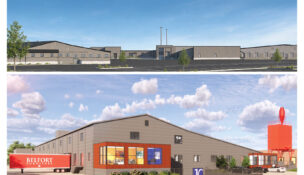Northern Va. Chamber unveils road map to reinvent economy
Proposed solutions include growing tech sector, affordable housing
Josh Janney //July 21, 2025//

Aerial view of highway, Tysons Corner metro line and station, skyscrapers and blue sky.

Aerial view of highway, Tysons Corner metro line and station, skyscrapers and blue sky.
Northern Va. Chamber unveils road map to reinvent economy
Proposed solutions include growing tech sector, affordable housing
Josh Janney //July 21, 2025//
SUMMARY:
- The Northern Virginia Chamber of Commerce released a road map to reimagine the region’s economy and address economic challenges from federal layoffs and contract losses
- The road map calls for workforce reskilling, tech hubs, energy infrastructure improvements and innovation investment
- To attract and retain talent, the region must expand affordable housing and child care
Investing in artificial intelligence and quantum computing and providing more affordable housing options are among the numerous ideas the Northern Virginia Chamber of Commerce has to reinvent the region’s economy amid challenges from recent federal layoffs and spending cuts that are hitting the region hard.
In collaboration with global professional services company Accenture, the chamber on Monday released NOVA Roadmap: A Call to Action for Northern Virginia’s Economic Growth, a plan for the area’s future economic success.
Amid the federal job cuts, shifting markets and increased global competition, the chamber sees a need to transform.
“Northern Virginia has long been a powerhouse, but we’re at a defining moment,” said NVC President and CEO Julie Coons in a statement. “The old playbook won’t secure our future. We must lead with intention, invest in our strengths, and build a more diversified economy that is not only prepared for change, but drives it.”
‘Crisis without precedent’
For decades, Northern Virginia has benefited from its proximity to the federal government, a strong business ecosystem and a highly educated workforce, contributing to 42% of the state’s economy, the chamber notes. However, federal job cuts and the cancellation of federal contracts under President Donald Trump have the region facing what the chamber deems “a crisis without precedent.”
Federal jobs account for approximately 15% of the region’s job market, according to the chamber, and last year alone saw $109 billion worth of federal contracts awarded within the region, with over 441,000 jobs directly dependent on government contracts.
“As federal workforce and contractor losses increase, Virginia’s unemployment rate is expected to rise to its highest level since 2021,” the chamber road map reads. “A 10 percent reduction in the federal workforce could create $6 billion in total state GDP loss and nearly $250 million in total state tax revenue loss.”
Last week, the chamber and Pinkston, a Falls Church-based communications firm, released a 2025 third-quarter survey of 135 business leaders with operations in Northern Virginia. Conducted from July 7 to July 14, the survey found that nearly 1 in 3 businesses were harmed by Department of Government Efficiency (DOGE) cuts, with 23% of businesses downsizing operations and 7% laying off employees. Some 80% of business leaders reported concern over DOGE’s ongoing activities.
Meanwhile, roughly four out of 10 business leaders surveyed anticipated that Trump’s tariff policies and negotiations may cause their business to decline. However, half (48%) expected no impact on their business at all, while 11% believed the trade war would result in growth for their businesses. Business leaders listed inflation (47%), federal downsizing (47%) and tariffs (41%) as the top external issues impacting their business growth.
Reinventing the region
Due to the recent increase in federal layoffs, NVC says it is “essential” for the economy to help people shift from federal to private sector roles. It emphasized the need to train and reskill employees in areas such as data center operations, secure infrastructure and automation platforms. It further suggested launching boot camps, modular courses and industry-recognized certifications to aid workers transitioning into new roles. The chamber recommended creating a regional talent transition alliance to align efforts among employers, educators, workforce boards and economic development agencies.
One of the chamber’s solutions to revitalize the economy is to focus on emerging technologies, including AI and quantum computing, as well as space, semiconductors, biotech and robotics. AI is projected to contribute at least $3.8 trillion to the U.S. economy by 2038, according to the regional plan, and if Virginia captures just 2% of this, it could generate $90 to $150 billion in economic value. The chamber recommended co-financing innovative technologies with government and corporate partners.
It also advocates for forming “tech hubs” in strategic locations where firms, universities and talent can converge. The chamber says Northern Virginia is well-positioned to emerge as an AI corridor, as the region is home to federal research agencies, military installations, universities and the world’s highest density of hyperscale data centers.
“Building a more competitive innovation economy requires providing growth-stage startups with access to scale-up infrastructure, venture capital and commercialization incentives,” the road map says.
Citing a Reuters report, NVC also recognized that with the rise of cloud computing and AI-powered industries, the demand for energy from Virginia’s data centers is projected to quadruple over the next 15 years. So, “to sustain its leadership position in the AI economic boom, Northern Virginia must strengthen the power grid, scale renewables and battery storage, and adopt on-site small modular reactors (SMRs),” the road map says. “All are fundamental to modernizing the digital infrastructure. Failure to do so will constrain the region’s ability to create and leverage the economy of the future.”
Other goals
To attract and retain talent, NVC says, Northern Virginia needs to be an affordable place to live, work and raise a family. Business leaders who responded to the chamber’s Q3 survey reported that affordable housing and lowering taxes should be the top two priorities for the region’s localities
The chamber emphasized the need to create more affordable housing options and expand access to affordable, high-quality child care. Solutions to affordable housing include zoning reforms that support multifamily units, streamlining the building permitting process and reducing regulations to speed the time it takes to increase housing inventory.
Another solution is to launch incentive programs, such as down payment assistance, first-time buyer incentives, access to low-interest financing, transit subsidies and other policies that support affordable homeownership.
NVC also suggested simplifying tax administration, digitizing and streamlining regulatory systems and modernizing procurement tools. The chamber believes these reforms will reduce barriers for startups and scale-ups, creating a more business-friendly environment.
Lastly, the chamber called for rebranding Northern Virginia as a destination of choice “for future-focused businesses and talent.” It says that Northern Virginia is underinvesting in marketing related to economic development by $2 million to $4 million compared with similar large metro regions and that it’s “time to level the playing field.”
For example, Fairfax County Economic Development Authority’s marketing budget is less than $1 million. In contrast, Greater Richmond dedicates around $2.7 million annually to business attraction and Austin, Texas’s Economic Development Department spends $2.6 million to $4 million on marketing each year.
“Northern Virginia stands at a critical crossroads,” said David Metnick, Accenture Public Service Lead for Virginia, in a statement. “Through this road map, we’re helping chart a bold path forward — one that leverages the region’s strengths in innovation, including artificial intelligence, while addressing its vulnerabilities.”
i


















